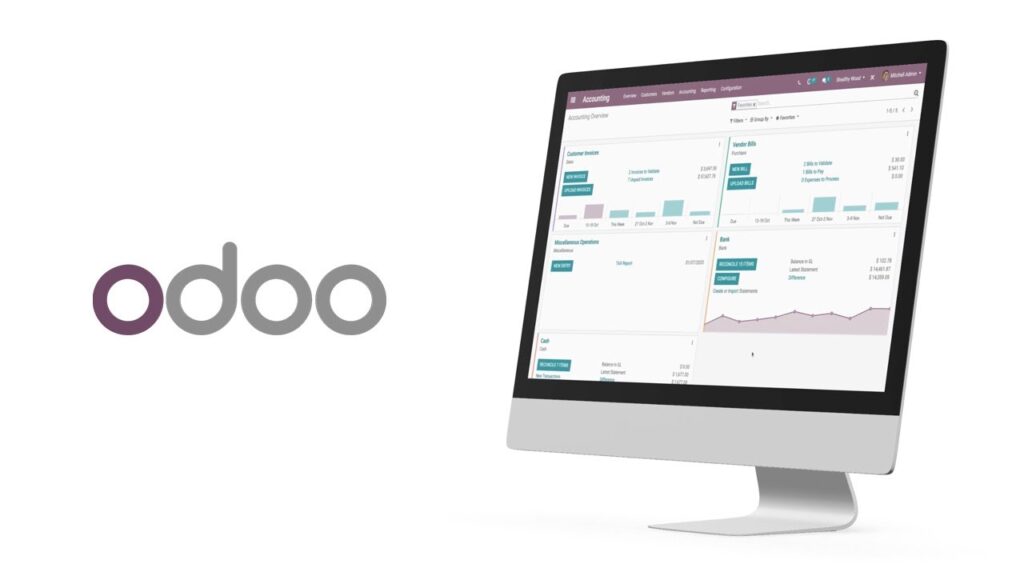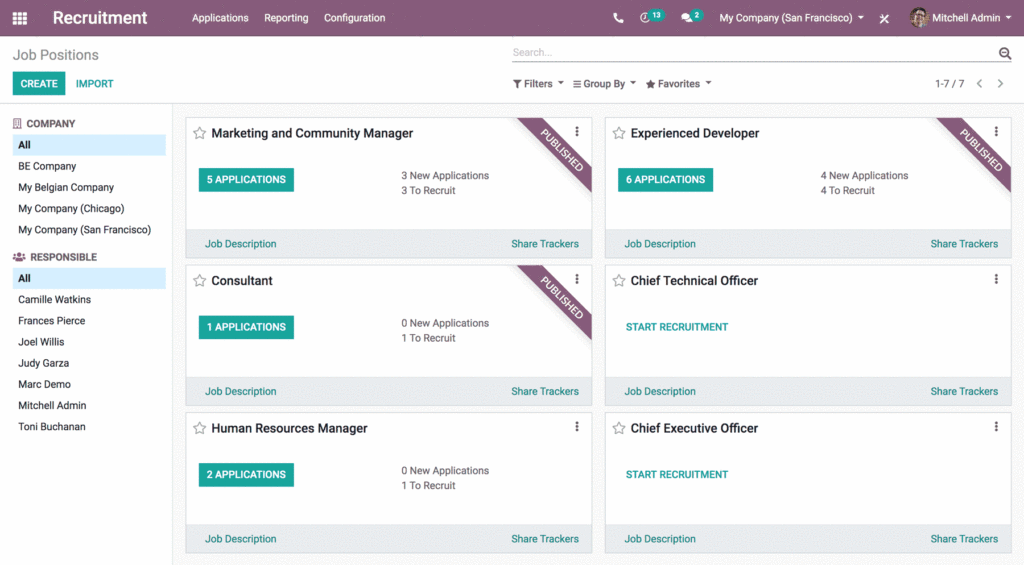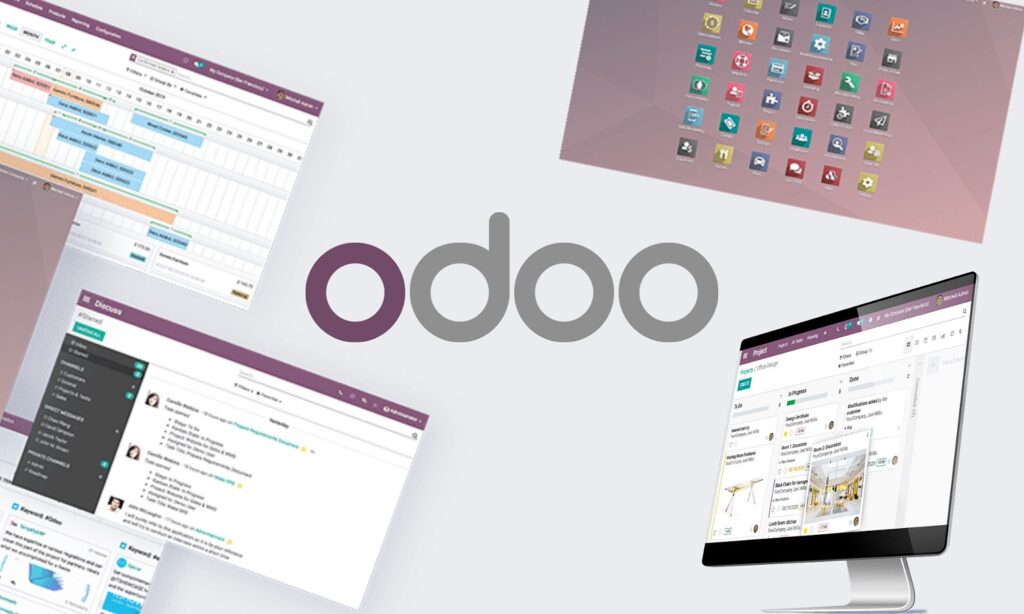Let’s talk about Odoo hosting requirements! Odoo is a suite of open-source business management software.
Versatile platform for managing CRM, sales, inventory, accounting, manufacturing, and e-commerce.
Odoo is a popular business management platform for all sizes of businesses. It streamlines operations and improves efficiency.
Why choose Odoo?
- It is open-source software. Odoo is customizable and open source, so you can tailor it to your needs and contribute to its development.
- It is a versatile platform. Odoo is a business management platform. Use it to streamline operations and improve efficiency.
- It is affordable. Odoo has a free version for small businesses and a paid version with more features and support.
- Total business visibility. Odoo provides real-time visibility into business processes, helping businesses make informed decisions and respond quickly.
- Integrated information among all departments. Odoo centralizes business processes and data for all departments. It helps improve collaboration and communication.
Different ways to host Odoo
There are two main ways to host Odoo: self-hosting and cloud hosting.
- Self-hosting
It means that you will host Odoo on your server. It gives you more control over the platform but requires more technical expertise.
Use any apps, certified or from a third-party vendor, or even build a new one from scratch. Software installation involves technical aspects that affect robustness and cost.
It is hosting Odoo on a cloud server. This option is more convenient but may not be as customizable as self-hosting.
It’s available in these modes;
- Odoo Online: Odoo Enterprise offers free hosting for customers who do not need customizations.
- Odoo.sh: Odoo’s free cloud hosting solution for partners provides easy collaboration, automatic builds, database backups, and a dedicated RunBot.
- Private VPS Cloud: This hosting solution provides a private VPS cloud for Odoo, with more control and flexibility than shared hosting. It can be customized to meet specific business needs.
Cloud hosting for small businesses with limited technical expertise; self-hosting for larger businesses with complex needs.
Why choose the right host?
- Odoo is a resource-intensive app that needs a robust hosting environment. Choose a hosting provider with the right specs for smooth, efficient performance.
- Odoo’s speed and responsiveness depend on the hosting environment. A slow or unresponsive website can frustrate users and lead to lost business.
- Security is a critical consideration when hosting Odoo. A secure hosting environment can help protect sensitive business data and prevent unauthorized access or data breaches.
- The right hosting provider can help Odoo scale and adapt to your business needs.
Choose the right hosting environment for Odoo’s performance, security, and scalability. Consider hardware, software, server location, security, and support.
Odoo hosting requirements
When choosing Odoo, there are various requirements you need to check on;
The Hardware requirements:
- Minimum 2 CPU cores (recommended 4+ cores)
- Minimum 4 GB RAM (recommended 8+ GB RAM)
- Minimum 100 GB hard disk space (depending on the size of the database and backup requirements)
Software Requirements:
- Operating System: Ubuntu 18.04 LTS (recommended), Debian 9 or later, or CentOS 7 or later.
- Database: PostgreSQL 10 or later, MySQL 5.7 or later
- Python: 3.6 or later
- Web Server: Nginx or Apache
- Odoo version: Latest stable version
Other Requirements:
- Git
- Pip
The hardware requirements may vary depending on the number of users and the modules you use.
Software requirements vary by OS. Use a cloud host for Odoo if you don’t want to manage your server.
The cost consideration factors
When considering the cost of hosting Odoo, businesses should take into account the following factors:
- Server Expenses: The cost of hosting Odoo depends on the size and complexity of the deployment. A small business may need 2-4 CPU cores and 6-8 GB RAM, while an enterprise may need 8-24 CPU cores and 64-128 GB RAM.
- Licensing Fees: Odoo Enterprise customers can use Odoo Online for free, but businesses with advanced needs may need a license.
- Ongoing Maintenance Costs: Hosting Odoo requires ongoing maintenance, including backups, updates, and security patches. Factor in maintenance costs when hosting Odoo.
Businesses can follow these tips to optimize costs without compromising performance and security:
- Choose the Right Hosting Provider: Choosing a scalable hosting provider and the right hardware/software specs can help Odoo run smoothly and adapt to changing needs.
- Use Odoo Online: Odoo Online is a free hosting service for Odoo Enterprise customers. It’s a good choice for beginners who don’t need customizations.
- Optimize Server Specifications: Assess your Odoo deployment needs to determine the best server specs and hosting environment. Saves money without sacrificing performance or security.
- Regular Updates: Keep Odoo updated for better performance, security, and lower maintenance costs.
Factors that affect Odoo hosting requirements
- Number of users: The number of users who will be accessing Odoo will have a direct impact on the hardware requirements. More users will require more resources, such as CPU, memory, and disk space.
- Modules: The modules you use in Odoo will also affect the hardware requirements. Some modules are more resource-intensive than others.
- Data: The amount of data you store in Odoo will also affect the hardware requirements. More data will require more disk space.
- Deployment Scenario: Odoo server specs depend on the deployment scenario. Cloud hosting may need less processing power and RAM than on-premises hosting.
- Operating system: The operating system that you are using will also affect the hardware requirements. Some operating systems are more resource-intensive than others.
- Web server: Your web server will also affect the hardware requirements. Some web servers are more resource-intensive than others.
- Database: The database that you are using will also affect the hardware requirements. Some databases are more resource-intensive than others.
Best practices to optimize Odoo
- Use a cloud hosting provider that offers scalable hosting plans. It allows you to increase or decrease your hardware resources quickly.
- Use a web server and database that are optimized for Odoo. It helps to improve performance and reduce resource usage.
- Optimize your Odoo configuration. Includes setting the correct number of concurrent users, enabling caching, and using the correct database settings.
- Monitor your Odoo usage. It will help you identify areas where you can improve your hardware efficiency.
- Caching: Use Odoo’s caching to improve performance by reducing response time for frequently accessed data. Enable caching for models, views, and other components.
In summary of Odoo hosting requirements;
Odoo hardware requirements scale with users, modules, data, and resources. Consult an Odoo expert or cloud hosting provider for specific needs.
To ensure a smooth and efficient website experience, choose a hosting solution that meets Odoo’s requirements.
2 CPU cores, 4 GB RAM, 100 GB disk space, Ubuntu 18.04 LTS, PostgreSQL 10+, Python 3.6+, Nginx/Apache, and the latest Odoo version.
However, the Odoo hosting requirements may vary depending on the size and complexity of the deployment.






